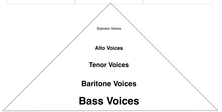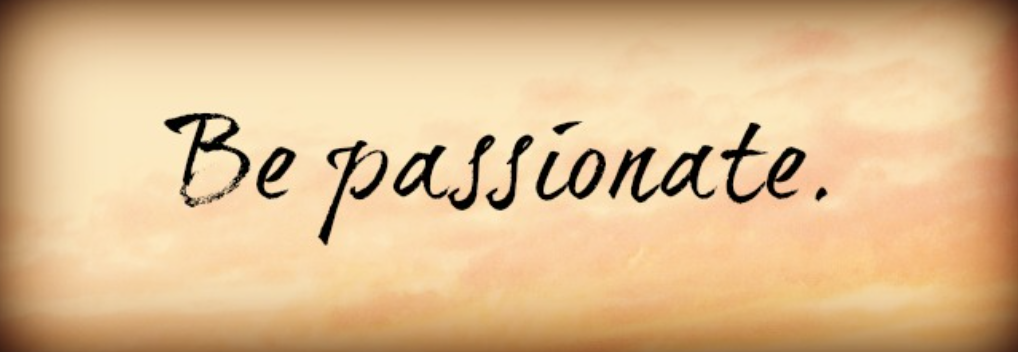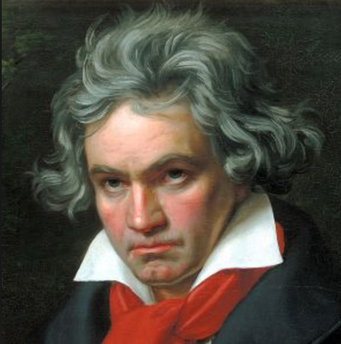|
Warming up is an important of any music (especially wind players) rehearsal. An effective warm up should address the physical aspect of preparation, as well as the mental aspect. There's an enormous amount of great warm-up sets out there and I thought I'd offer some personal thoughts about how to effectively use all the different resources at one's arsenal. Tone Quality I think that practically every band director would agree that tone quality is the most important element of playing. As I tell my students all the time, you can play some music that is incredibly difficult and challenging, but if you don't sound good, it's not impressive. Bands need to sound good to be successful. So, after some breathing exercises to get the air going, long tones should be incorporated. A focused airstream is essential to great tone production. I prefer Remington's way of descending chromatics, but really any sustained pitches in a comfortable range will do. During these long tone exercises, students can really focus on air and embouchure. I won't go into specifics about embouchure and such, as there are a TON of great resources out there. For woodwinds, you can always refer to the Westphal (Teaching Woodwinds). For marching band brass, I would take a look at what a lot of the drum corps are doing... since brass embouchure is what they do all summer long. I also like how a lot of them focus on keeping the embouchure healthy (always remember to warm down!!!) As we all know, without a solid foundation in tone quality, blend and intonation are not really a possibility. You could probably play with a "balanced" sound, but it wouldn't be a good sound.. Flexibility Next would be applying that good sound while getting around the multiple registers for the instruments. For brass, this means flow studies and lip slurs. It takes a while for young brass players to master getting over the partials and centering the tone and pitch while doing so. Students must master the correct vowel placements inside the mouth and get the perfect air speed. Again, if you want to see some more in-depth exercises and explanations, check out what the drum corps are doing. I really like what Carolina Crown does to warm up and their attention to the health of their chops (note: I've seen more of what they do than the other corps because they're right up the road...the other corps probably do great stuff too!) Then comes the woodwinds. Woodwinds obviously don't need to warm up the lips like brass players do, so this is a great time for them to do some work in the various registers (and moving between registers) as well as getting the fingers going. If you use Foundations for Superior Performance, you know this well...great book. Pick your favorites and use them for a quick marching warm up if necessary. Also, if you have the directors/staff to do this, flexibility may be a good time to split the brass and woodwinds to focus on specifics of the warm-up. (but always bring them back together for final tuning and ensemble sound)  Ensemble Sound Once you've gotten the basics of the individual warm-up and playing down, then it's time to focus on the ensemble sound. Firstly, musicians should be striving for a blended sound in their section and across the band. I recently received a comment from a judge at Festival pertaining to the fact that the students played with a characteristic tone quality, so much of the intonation took care of itself. I say this because if the musicians have that characteristic tone quality, then blend should happen pretty easily, creating a rich and sonorous quality to the ensemble. Another important aspect of ensemble playing is balance. Balance refers to the volume of individuals as well as sections. In a clean ensemble sound, you don't hear individuals "sticking out" of the texture. Once sections are playing the same volume, then its time to employ the balance between the sections. The most common way to create a rich and dark ensemble sound is to employ Francis McBeth's Pyramid of Balance. There are other methods of balance out there, but I think this will probably give you the most success. Plus, Francis McBeth's music is awesome. Now, let's not forget about intonation. We've all seen tons of different ways to tune an ensemble. I'm not going to say a specific one is the best or even recommend one. You should try out various tuning methods until you find one that works well for your ensemble. What I will say though, (my opinion) students should be tuning at all times. Because the temperature is constantly changing (especially in marching band!!!!), students must constantly adjust and need fine-tuned ears to excel with intonation. You definitely don't want that "fuzzy" sound that results from out of tune playing. Playing in tune is a battle, grab your tuners and get ready for the fight. Articulation and Cleanliness It is also important to define an ensemble articulation. Though each instrument has it's own specifics for HOW to articulate, the end result of the beginning of the sound should be homogenous. Incorporate articulation exercises of all types. Then make sure that students LISTEN to proper articulation demonstration (by a director or great student player). After hearing great articulation demonstrated, students must then re-create the sound, and LISTEN to each other in order to create a consistent sound across the band. Also, write out exercises for every articulation students will see within the halftime show/stands tunes/etc. Practice these in the warm-up and apply when necessary (i.e. accents, staccatos, tenutos, etc). Note Length is also a very important aspect to address during the warm-up. Note lengths should be addressed from the first note played. This is especially applicable to releases. A great band will release together consistently...a developing band will have various individuals hanging over and releasing too soon (both bad!). You can also address style within the warm-up, especially if it is in relation to what the field show contains. Maybe there's a section where you place some space between quarter notes. Work it out in the warm-up and apply it later. In conclusion, the ensemble warm-up is one of the most important things a band will do. If you consistently warm up the ensemble before rehearsals and performances, the ensemble quality will grow in all of the above mentioned areas.
These are just some thoughts, if you read, hopefully you'll find something useful. If I left something out, add it in the comments section!
0 Comments
This week I turned 30 and decided it was time to reflect a bit on the past ten years of my musical life. I've grown immensely as a musician, educator, and composer. Here are some of my thoughts: Hard Work Does Pay Off Ten years ago, I was a sophomore in college at the forefront of spending many hours in a practice room...and in the music library (listening)...and working band camps...and studying like crazy...basically soaking up everything like a sponge. When I first stepped into the classroom, my hard work had paid off. I was able to quickly get my feet on the ground and have a successful band program. That being said, I did have to work insanely hard my first few years of becoming a teacher and professional. Now I've got a great band with a lot of students that achieve regularly. We get consistent superiors at festivals and I feel like all the years of working my butt off has definitely been worth it. Hard work and diligence really do pay off! Listening is Paramount As a band director, musician, composer, clinician, etc, my ear guides me. I was encouraged several years ago to listen to a lot of everything. One of my mentors, Jay Bocook, made sure that I was listening to a wide variety of music. The lesson was in context of me improving my arranging skills, but listening practically non-discriminately has totally shaped me as a musician. When I compose, my ear guides me (I can hear reverberations of Tchaikovsky and Bach, Stan Kenton and the Beatles). When I arrange, I have a lot of techniques and tricks to engage the listener. As an educator, I really know what a good band sounds like and shape my kids to sound the same. It's also important to listen to a variety of skill levels as well. Because of frequenting festivals (not just Midwest), I can hear intonation and timing issues, and can usually come up with a way to fix them! And sometimes I just need to sit down and turn the lights off, put on some Beethoven, and just listen in sheer awe of the magnificence and beauty.  I use this website to organize my ideas, it works great for writing everything down in the cloud! I use this website to organize my ideas, it works great for writing everything down in the cloud! Write Down Your Ideas Always write down your ideas. Or take a voice memo. Or email yourself. Or put it in your calendar for a later date. With the recent technology boom of iPhones and the Cloud and really online everything, there's no excuse. There's also nothing as frustrating as forgetting that awesome idea. For example, I had a reminder to write "10 Things I Learned in My Twenties," which resulted in this blog post. So write it down. Or send it up into the cloud. Whatever works. Understand One's (My) Place My few years out of college, I remember a stark contrast between the immersion of music school and the rest of the world. I've redirected a lot of who I am as a musician and educator over the past ten years, significantly increasing my advocacy efforts. I see so many of my friends and fellow musicians struggling because it seems that the average person doesn't prescribe a lot of value to classical oriented music. (Here's a whole post I wrote about this) I've certainly found my place as a musician and a lot of it is bringing the masses back to the concert hall. I do my best to create engaging concerts for my students and parents that will hopefully evoke a curiosity that will lead them to buy a ticket to the symphony, or a musical theatre, or even just a little chamber concert. Be Passionate Being passionate will count for a lot. Friends will want to take part, students will buy in, and colleagues will respect you. For others to know and see your passion(s) is huge. My students know that I love music. They see it every time I pick up my trombone or really get into conducting a piece. They then have an understanding of what makes me tick and it truly helps me to bring out their greatness and to help them find their passions. Professional Development is a Must In my college years into my first few years of teaching, I read a lot of books. Specifically I read a lot of books that helped me grow as a leader and a teacher. A lot of the books written for business professionals apply well to teaching (band directing is very similar to running a business). A few of my favorites: Ron Clark's books were great for inspiration; How to Win Friends and Influence People taught me to effectively communicate with people; The 7 Habits of Highly Effective People is great info and helps to get organized and effective; and every GIA Publications book I could get my hands on. Being a working professional doesn't mean you need to re-invent the wheel. I know so many "bullish" band directors who are avid about trying (and often failing) their way no matter what. My advice would be to look at the wealth of knowledge out there and learn from other people's mistakes. There's definitely something to making your own mistakes to learn and grow, but somebody has already walk the same path, so you might as well learn from them. All that being said, I've learned to soak up everything. The best people in any field NEVER stop learning. Enjoy What You Do
Some of the best advice I ever received was to stop being so serious. I came into this profession like a barreling train, totally bent on success. When I had that attitude, my frustrating days were quite rough. When I started to take a step back and really enjoy what I do, everything (and I do mean everything) got a lot better. I became more effective as an educator and my students were better as well. My style is not to be crazy serious all the time, but to be serious when necessary. Conclusion My twenties were good and I learned a lot about what it means to be a musician, composer, and educator. See you in 10 years for "Things I Learned in My Thirties."
Why is Classical Music Dying?
When I was young, I can remember actually expressing distaste, even mockery, of this the classical genre. It was almost even taboo to like anything that wasn't driven by lyrics, guitars, and a drum set. So why the divide? Why don't average (non-musicians) listeners consistently fill their Spotify Stations or iPods with Beethoven, Bach, or Wagner? And why do many only pull out Mozart to study? Here's what seems to have happened:
Back in music history class in college, we listened to lots and lots of musical examples as we wound our way through the years. I can remember listening to examples of 20th century piano music and all my non-music friends literally thought a child was banging on a piano. Now, in no way do I mean to devalue the composers by comparing great works of art to a child banging on a piano, but to the untrained listener, it doesn't make sense. Over time, as musicians performed these works in concert halls, I'm sure the general public was very confused and, honestly, just stopped going to concerts. Personally, even being a consummate student of music, I find it difficult to sit through a concert of atonal music. Now, as concert halls were being filled with these sometimes harsh and unpredictable sounds, pop culture music was on the rise.
The Rise of "Pop Culture" Music (Pop Culture Music referring to the most popular music of the time period)
Just as classical music reached its height of chromaticism (and other experimental things, see John Cage), we start to see pop culture music on the rise. For example, it's doubtful that many people know who John Cage was, but I bet most people knew Glenn Miller. Jazz being the pop music of the 1930s and 1940s.. and then Jazz morphed in the the popular forms of the Blues.. and then the Blues morphed into Rock and Roll.. and then combinations of various forms blended to where we have the Pop music of each decade like 80s Music, or 90s Music.. (please realize I know that that was a VERY abridged version of the progression of music) Which brings me to today in 2015, where we've mashed Classical Music into a category next to say, Alternative. Or better yet, Dance! The sad part is that by doing that, we've put Philip Glass in the same category as Gustav Mahler. The two composers have about as much in common as Eminem and Taylor Swift. And now I'm brought to the absolute purpose to this post, and what I feel is my increasing charge as a composer and educator: bring people back to the concert hall. Strategies for Bringing Classical Music Back 1) Music Teachers - Music teachers are training new musicians all the time. I encourage my students to go to performances and to see and hear professional musicians. As band, choir, and orchestra students get into music, they'll naturally migrate to performances simply because they have an understanding of what classical music is from their own training. 2) Musicians - I am so encouraged by seeing classical musicians "breaking the mold," not because classically oriented music should be inherently changed, but musicians creatively reaching new audiences. Here's a couple of examples:
These two examples are quite different, but would certainly evoke a curiosity in anybody who decided to click play. The first video has almost 9 million views, surely some of those views are from non-musicians who maybe now have somewhat of an appreciation for Beethoven.
3) Basic Understanding of Music - Here's what would be fantastic--if everyone (or most people) had a basic understanding of music. What if everybody knew how to construct a major scale? What if everybody knew the difference between a trumpet and a trombone (it's frustrating how many people don't..)? What if everybody could tell the difference between a violin and viola just by looking at it? Or based on how the orchestra was seated? These questions take me back to my childhood. Once I had a basic understanding of the mechanics of music, classical music was no longer beyond my reach... and now it's what I do for a profession. My hope is that myself and the rest of us who've dedicated much of our lives to music (specifically classically oriented music) can bring audiences back into concert halls and venues. I hope that more people will give Beethoven or Bach or Mendelssohn or Schubert a chance! In this generation of mindless Tweeting and Facebook posts, I hope that we can get back to sitting for an hour or two and listen to some timeless works of art. Longest post yet. By far the most important. |
AuthorThe musings of a composer that also band directs!! ... or maybe it's the other way around.. Archives
May 2021
Categories |
John McAllisterComposer, Educator
- Start Here
-
Music
- Concert Band - Marches
- Concert Band - B
- Concert Band - VE
- Concert Band - E
- Concert Band - ME
- Concert Band - M
- Concert Band - A
- Adaptable Duets
- Adaptable Trios >
- Adaptable Quartets
- Brass Quintet
- Adaptable Quintets >
- Etudes and Exercises
- Marching Band >
- Video Games
- Jazz
- Christmas/Holiday
- 2023 Christmas Music
- Strings
-
Instruments
-
Free Resources
- Bonus Content
- Contact
Follow on Youtube, Instagram, or Facebook
|
Tip Jar? Click below. More coffee. More free stuff.
|




 RSS Feed
RSS Feed
